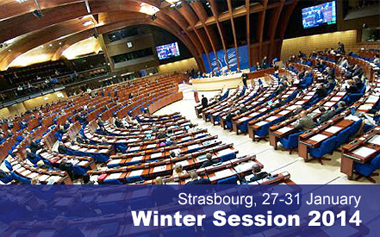Á ÞINGI EVRÓPURÁÐSINS: BEINT LÝÐRÆÐI VERÐUR KRAFA 21. ALDARINNAR
Á þingi Evrópuráðsins var í vikunni samþykkt tillaga um að efna til víðtækrar umræðu um internetið og lýðræði. Að þessari umræðu komi þjóðþing, stjórnmálaflokkar, fjölmiðlar, samtök fjölmiðlafólks og aðrir aðilar. Tekin verði saman Hvítbók þar sem birtist afraksturinn af þessari vinnu.
Margir tóku þátt í umræðunni og lýstu flestir eindregnum stuðningi við tillöguna og þær áherslur í sem var að finna í skýrslunni sem fylgdi tillögunni.
Ég fagnaði þessum áformum en gagnrýndi jafnframt ýmsar áherslur skýrslunnar um beint lýðræði. Ég sagði að „stofnanaveldið" ætti ekki að leyfa sér íhaldssemi í þessum efnum heldur nýta þá kosti sem ný tækni byði upp á hvað varðar beint lýðræði. Ég sagði að beint lýðræði muni verða krafa 21. aldarinnar.
Ég tók einnig skýrt fram að menn ættu ekki að horfa framhjá misnotkun á netinu og minnti á að Evrópuráðið hefði fengið í hendur óyggjandi sannanir fyrir því að netið væri notað sem tæki barnaníðinga. Þetta ætti ekki að líðast fremur en ofbeldi annars staðar í samfélaginu. Internetið væri hluti af samfélaginu en stæði ekki utan þess.
Skjalið sem var til umræðu:
http://assembly.coe.int/ASP/Doc/XrefViewPDF.asp?FileID=20329&Language=EN
Ræða mín:
Internet and politics: the impact of new information and communication technology on democracy.
Ögmundur Jónasson:
This discussion is very timely and I think indeed it is going to be relavant at all our meetings in the coming years.
I strongly support the core recommendation of the report and here I refer to article 111. in the conclusion of the report with the proposal of launching "the drafting of a Council of Europe White Paper on "Democracy, politics and the Internet".
This, "would constitute logical follow-up to the World Forum on Democracy held in Strasbourg on 27-29 November 2013. It should involve all our national parliaments and governments in a wideranging collective discussion process, as well as the political forces, the main Internet operators, the media -particularly the public broadcasting services and the national and European media associations - the universities and the leading experts in this field."
This is a good proposal and I strongly support it.
I attended the World Forum on Democracy referred to, where there was a very good and lively discussion on democracy. There were varying views on different forms of democracy, the deviding line being between representative democracy on the one hand and direct democracy on the other.
This paper takes sides in this debate, strongly favouring representative and institutional democracy calling as a witness in this respect no-less a person than Edmund Burke the 18th century philosophic founder of modern day Conservatism.
On liquid democracy in paragraph 33 the following is said: "Individual citizens become aware of and participate in mobilizations, sign petitions, demonstrate electronically without ever belonging to anything."
But I ask why do you have to belong to anything? Can´t you in your own right come forward with your own views and standpoints without belonging either to a political party or indeed any other social institution? This is an example of growing conservatism in the institutional world which is becoming ever more defensive and conservative in the face of new technolgies opening up new dimensions in democratic discourse and decision making with enormous liberating potential.
To do the report justice, however, it must be said that it meticulously refers to the various nuances of this debate though always siding with the institutional world. In the summary at the outset it says:
The Internet now lies at the heart of democratic society... It has enabled citizen groups to mobilise and hold governments and politicians accountable as never before, expanding public participation in democratic processes. ..."
"On the other hand", it says in the summary " fragmented web-based decision-making is not necessarily suited to complex policy-making...Replacing representative democracy with some form of "direct democracy" via Internet voting would bring the risk that small groups with greater resources could dictate final decisions without being known or required to account for them, wielding illegitimate power. The web can also facilitate abuse..."
Although I have my strong reservations on the criticism on direct democracy, which I think will be the norm increasingly replacing representative democracy in the 21 century, I do agree that the internet can be and certainly is being misused.
Here I refer to the way in which the internet is being used for exploitation. In our work on child abuse in the Council of Europe we have had reports on how the internet is increasingly being used as a vehicle of child abuse, something we should not take lightly, any more than we are willing to tolerate such abuse in other open spaces in society.
Let us never forget that the internet is part of society and does not stand outside it.
But I am grateful for this valuable report and I reiterate my support for further work in this field as suggested in the recommendations.

